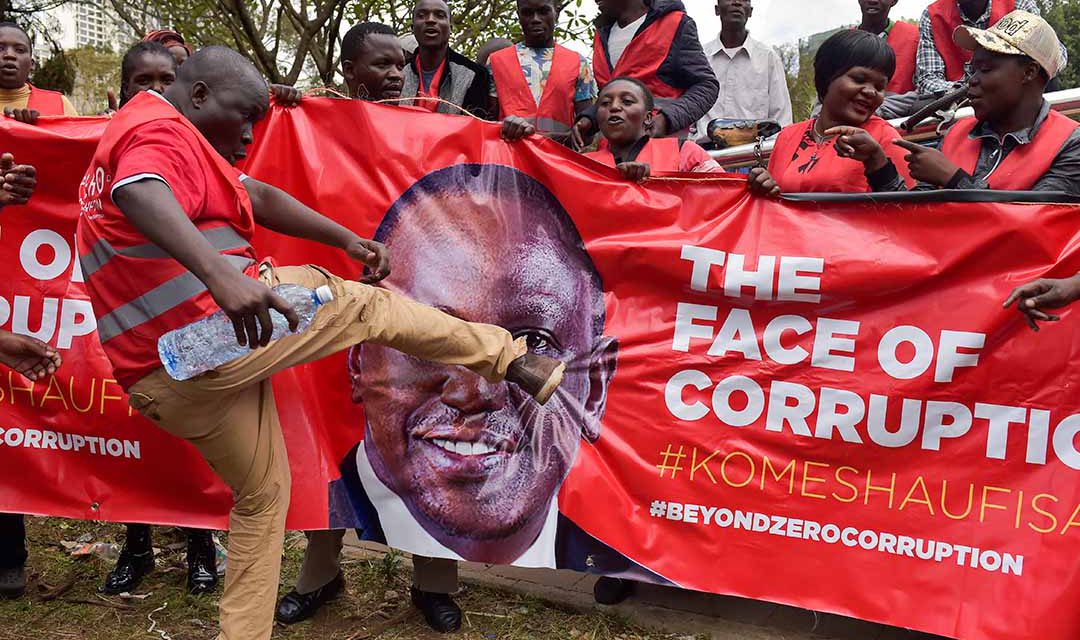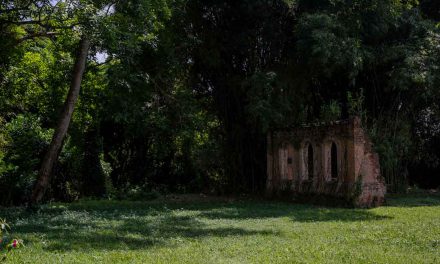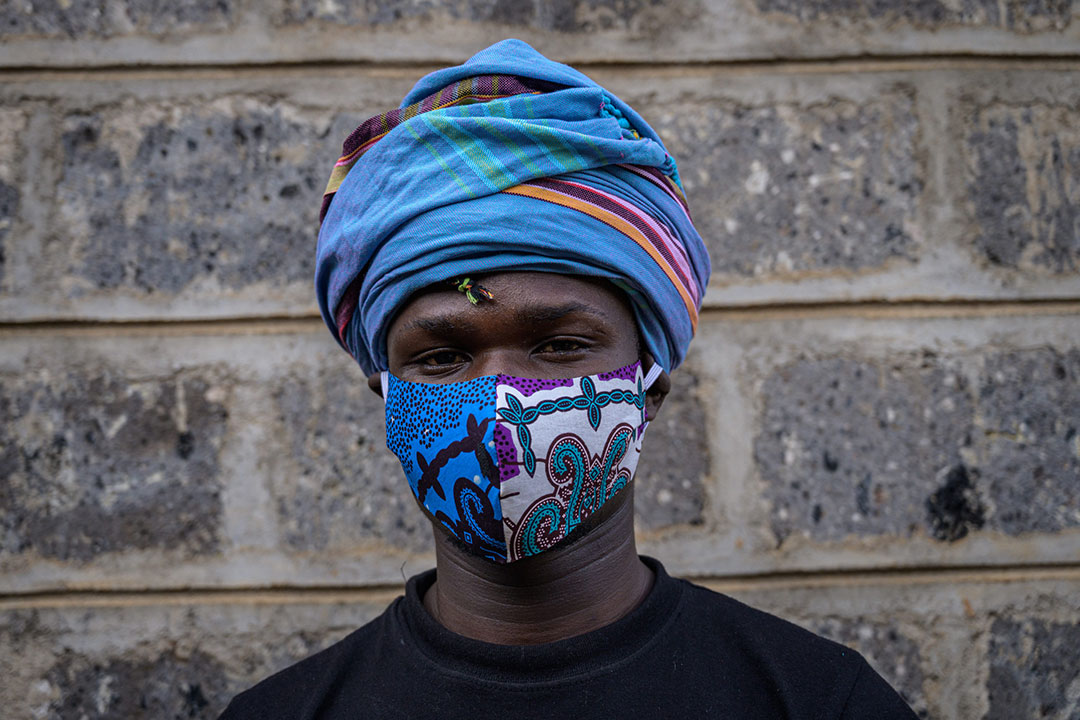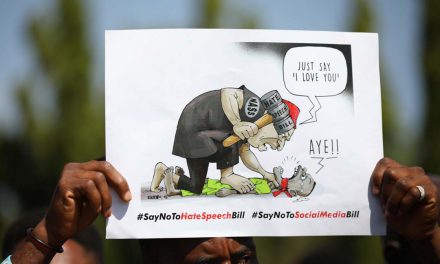Kenya: Armed and dangerous
Desperate and ruthless gangs find firearms widely available in Nairobi’s slums, presenting a constant security risk to the city’s residents
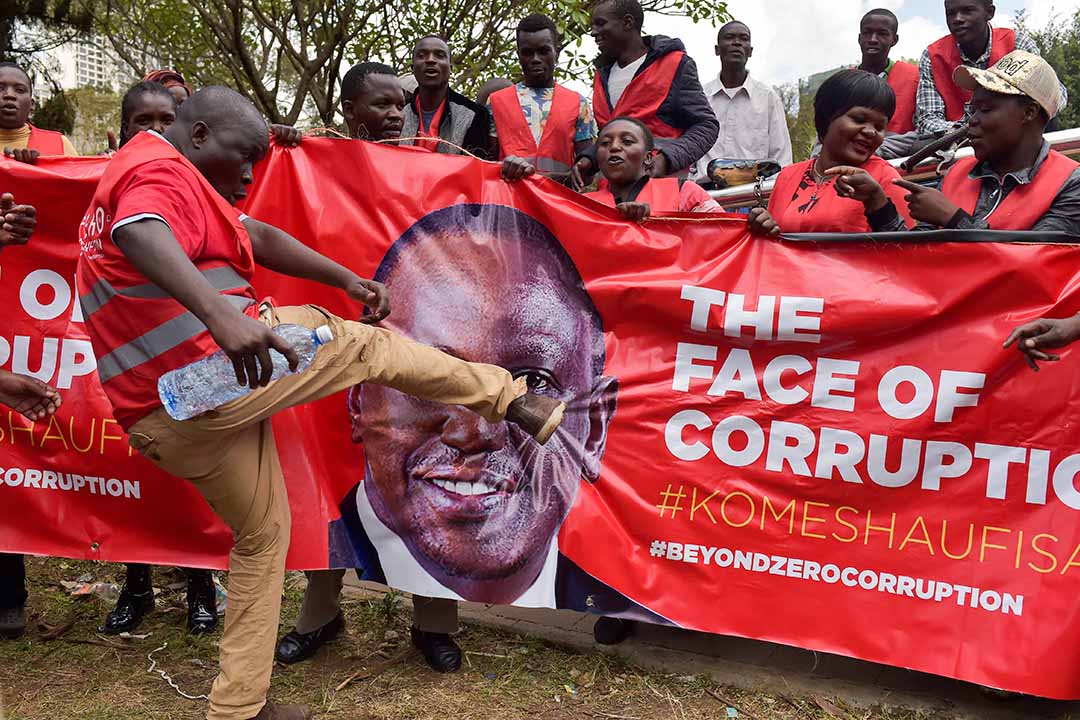
A man kicks a banner held by protesters in
Nairobi during an anti-corruption demonstration in April, 2019. Photo: SIMON MAINA / AFP
A message posted on a Kenyan Facebook group known as Dandora Love People on 31 March, 2017 read like the opening lines of a scary movie script. Written by a member under the name of Hesy Wa Dandora, it said: “I won’t get tired to remind you guys, this is a Friday and mostly, such a time until Sunday is when thieves get killed either by mob or bullets.” The writer went on to remind the criminals that the police “hadn’t run out of bullets”. Bullets would be used, he explained, to ensure that law-abiding citizens were protected. He went on to warn the criminals to take care, “lest I post your picture here this weekend”. Signing off the long Facebook post, he concluded: “countdown starts now”. Within about three hours, news went round that the police had killed six suspected gangsters, all of whom were thought to be younger than 20 years old.
Two pistols, an AK-47 rifle with 14 rounds of ammunition, a hand grenade and three machetes were recovered from them. Little more than a week before, on 22 March, police had shot dead four suspected gangsters who had allegedly been committing crime in Nairobi’s Eastlands area. On that occasion, a post on the Dandora Love People page said: “If you are unable to reach your loved one on phone or in any other way, he might be among these ones. They were gunned down last night … He who does not hear an elder’s word breaks a leg”. The members of the group pride themselves on being born and bred in the Nairobi suburb of Dandora, commonly referred to as “D”. Their Facebook page is intended to reflect their suffering at the hands of hardcore gangsters. Maria Mutua, a widow and a mother of six, says she lost her husband in 2012 to criminal activity – yet what happened on that day remains a mystery to her and the children. Her husband was a casual worker with a building firm in Industrial Area, she told Africa in Fact amid tears.
On the fateful day there had been no work, so he had come home early. Later, he had joined friends at a neighbouring “local” – slang for bar. “At around 10pm, I heard gunshots,” says Mutua. “They sounded as if they were being shot from my bedroom. I was scared and shouted to my children to lie down and remain silent.” Outside, gunshots mixed with the intermittent barking of dogs. Mutua thought it might be her family’s final day on earth. Wondering where her husband was, she prayed. When the shooting stopped, she tried calling Baba Jemo, as he was known. His mobile phone rang unanswered. Matua hoped that he had not been caught up in the shooting on his way home, and that he had found refuge somewhere. At around 2.30am she received a text message from a neighbour who owned a tuck-shop nearby. The short message gave her cold shivers. Pole kwa msiba, it read (sorry for your loss). The police later told her that Baba Jemo had been killed by a stray bullet during a gun battle between security agencies and a local gang.
Death is certain for everything that is born, she says, but the random death of her husband was hard to understand. “He was everything to our family. He clothed us, paid rent for our house, and bought food for the family.” Seven years after her husband’s death, Mutua says that little has changed as regards crime in the area. Guns and bullets are easily accessible to youths, many of whom are idle and jobless, she says. Since then life for her family has been a “long, tedious and rough walk”. Three of her children have since graduated from university without finding employment. It’s difficult, she says, to get a job when competence is shut out by ethnicity, nepotism and bribes. Another resident, Winston Kariuki, confesses to running an illicit business to earn a living. The 32-year-old says he finished his degree in actuarial science at the University of Nairobi in 2013 but gave up looking for employment when he was turned away from three jobs, despite emerging as the top candidate in the interviews.
He came close to committing suicide, he says. He was under pressure from his parents and his peers to find a source of income. Then he was introduced to a group of young men who were “looking for opportunities”, especially in relation to commercial banks. They would study the banks’ systems and hack them to steal money, he says. The “business” was lucrative but risky. Sometimes they would intimidate bank IT officials into disclosing critical systems information using firearms bought in Eastleigh, a satellite town near Nairobi dominated by the Somali community. Jacqueline Nafula, an activist in Dandora who advises youths about alternative income sources such as non-formal businesses, says Kariuki’s story isn’t surprising. “How do you expect young, brilliant and energetic people to earn a living if there are no jobs out there for them?” Firearms are widely available in Dandora and other Nairobi slums and therefore represent a constant security risk to residents of the city. It’s not hard to acquire a gun in Nairobi, provided you have money, a police officer told Africa in Fact in confidence.
Guns can be bought – or simply hired for the occasion. Unlike Kariuki, other men face obstacles even getting an education, impacting on their life chances. Alex Nzau, a 36-year-old father of three, was unable to complete secondary school after his parents, who worked at a commercial bank, were killed in the terror attack that targeted the US Embassy in Nairobi in 1998. Nzau was sitting for his final national primary school examinations at the time. Despite the trauma of his parents’ death, he was determined to perform well, but without money to pay school fees he was unable to progress to secondary school. As the oldest child, he had to give up on the possibility of further education to look after his younger siblings. “I had to make hard choices,” he told Africa in Fact. But how does a boy of 15 look after a family? Nzau says he tried to find ways to earn money, but nothing came of them. “That is how I ended up doing highway robberies,” he says regretfully.
The weapons were leased from merchants in Mathare. He and his gang mates would pay as much as Sh30,000 ($300) for a night. On “dry days” the rent went down to Sh10,000 ($100). “We threatened, we tortured, we maimed, but we never killed,” he told Africa in Fact. “That was our cardinal rule. We only used our weapons when our targets showed resistance. That is one thing I don’t regret.” But earnings from criminal activities dwindled when security patrols were intensified. In 2004, Nzau began to think of leaving the life he had lived for five years, despite threats from his gang mates. The police were letting it be known that anyone in possession of a weapon should surrender it or “face the full force of the law”. Today, Nzau runs a small church in the coastal city of Mombasa. If he has a piece of advice for younger men today it is this: not to be in a hurry in life. It is this desire to get rich quickly that drives youths to crime, observes Netia Khalwange, a social scientist in Nairobi.
“Patience doesn’t kill,” she argues, claiming allegations that corruption, nepotism and ethnic favouritism keep people out of jobs are “baseless”. Young people need to acquire skills that make them employable, she insists. There are also opportunities to keep themselves busy and earn a living – in the informal sector, for instance. The blend of desperation, a desire for quick riches and the availability of guns has seen crime levels skyrocket in recent years. Young men without jobs still have energy and they will use it. Gangs still work their trade, despite the criticism of social workers. The Kayole Gaza Group, for instance, which is said to consist of boys and young men between the ages of 12 and 19, is one of Nairobi’s most ruthless criminal gangs, known for ferocious robberies during which victims are maimed or killed. Members are said to be ready to die. Their activities are so deadly that a specialised police officer has been assigned to track their activities.
The officer, who goes by the alias of Hessy wa kayole, regularly posts photos on different Facebook platforms of Kayole Gaza Group members gunned down during their criminal activities, says another police officer in confidence. The armed youths are apparently setting out to emulate the operations of a secretive gang, Mungiki, which was banned by the Kenyan authorities in 2003 but is still reputed to be one of Kenya’s most ruthless criminal organisations, known for beheading their victims. Following police operations, Mungiki recently seems to have reduced its criminal acts, though it is still prevalent in extorting money from businesses. Classified as a terror group in 2008, Mungiki was at the centre of the post-election violence in 2007. Indeed, a commission, which was set up to investigate the 2008 post election violence in Kenya, blamed Mungiki for perpetrating violence, particularly on Luo and Kalenjin tribes, whose political leaning was towards the opposition.
Residents enduring Nairobi’s latest crime wave suspect that there may be links between the two social media “activists”, Hessy wa Dandora and Hessy wa Kayole and the police, but the authorities have denied any association.
Mark Kapchanga is a senior economics writer for the Standard newspaper
in Kenya and a columnist for the Global Times, an English-language newspaper
in China. He is pursuing a PhD in investigative business journalism at the
University of Nairobi.

